Peter MALONE
Saturday, 18 September 2021 19:43
Summer Place, A
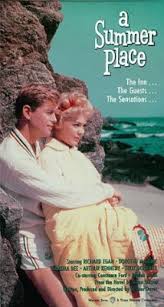
A SUMMER PLACE
US, 1959, 130 minutes, Colour.
Richard Egan, Dorothy Mc Guire, Sandra Dee, Arthur Kennedy, Troy Donohue, Constance Ford, Beulah Bondi.
Directed by Delmer Daves.
A Summer Place was based on a novel by Sloan Wilson (The Man in the Grey Flannel Suit). It was considered somewhat daring at the end of the 1950s. However, it was a sign of the times. The film was written and directed by Delmer Daves who directed a number of significant westerns and action films during the 1950s, including the breakthrough film about relationships with Native American Indians, Broken Arrow. He also made the classic 3.10 to Yuma. After this he made a number of romantic melodramas like Parrish and The Battle for the Villa Fiorita. Previously 20th Century- Fox had been making this kind of film, for example Peyton Place, A Certain Smile, Bonjour Tristesse. Daves established Warner Bros as a studio for making this kind of film.
The film focuses on two adults who betray their spouses and begin an affair. Their children also enter into a relationship. The film features the very popular song and a score by Max Steiner.
1. Why do audiences enjoy this kind of popular drama? How was this film typical of the style of the fifties and early sixties? How would this kind of film be made now?
2. The contribution of colour, locations, the ocean and waves and cliffs, the houses and yachts? The music background and the popular theme?
3. The nature of the title, the use of the title as a symbol for the lives and conflicts and their meaning?
4. What values did the film take for granted in its screenplay, in audience response: the nature of the value of persons and the importance of their lives, the quality of love, the nature of marriage, individual happiness and freedom, individual rights?
5. What moral stances did the film take? What moral stances did it presuppose In audiences? Absolute values of good and bad? A relativity of morals to circumstances? What norms for marriage, love and its fulfilment? Its treatment of social hypocrisy? The influence of example of people's lives? Strict moral stances versus lax stances?
Obvious breaking of moral conventions? The nature of repressed puritanism?
6. The Hunters, the memories of the past, the quality of their marriage over nineteen years, Bart's drinking, his snobbery and failure, preoccupation with money? His memories of Sylvia’s love for Ken? His living with this? Sylvia's memories of love, her decision to keep going, her relationship with her son? The pros and cons of their marriage? What ought Sylvia have done in regard to Ken? Allowing herself to be persuaded? Her mother presenting the alternatives? Whose fault was it that the marriage broke, or was it irreparably broken? Public reaction to the breaking of the marriage?
7. The Jorgensens, the reasons for their marrying, Ken’s background as the lifeguard, his reaction to Sylvia’s marrying Bart, his making of money, lack of love in his life, conforming in the marriage, returning to find Sylvia’s asking her to commit adultery with him? The reaction of Helen? Her narrowness, strident harshness, bordering on hysteria? Her despising of her husband? Her snobbish attitudes towards the Hunters? Her supervising of Molly, especially the doctor's examination? Her bluntness in naming names and speaking the truth? Was the marriage irreparably broken? Was it better for Ken to leave?
8. The film's portrayal of scandal: the American values, the newspaper headings, the critique of hypocrisy under conforming to moral standards, repressed puritanism?
9. The relationship between John and Molly? Their reaction to their parents, the shock? Influenced by their parents? The quality of their love as portrayed in their life at schools? The reasons for their not consummating their love? The pressures that drove them together? The forced marriage and their trying to get married? Forcing them back to Ken and Sylvia and the final acceptance?
10. What insight into marriage, law, divorce did the film offer?
11. Was it important that the film had an atmosphere of wealth and luxury?
12. The film is described as 'soap opera'. Justified? How much cliche and glamour? How much exploration of real issues and values?
Published in Movie Reviews
Published in
Movie Reviews
Tagged under
Saturday, 18 September 2021 19:43
Summer Storm
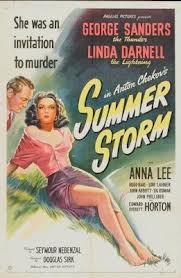
SUMMER STORM
US, 1944, 106 minutes, Black and white.
Linda Darnell, George Sanders, Anna Lee, Hugo Haas, Edward Everett Horton, Sig Rumann, John Abbott.
Directed by Douglas Sirk.
Summer Storm was the second American film by German-born director Douglas Sirk. In 1943, after moving from a career in Germany, he made Hitler’s Madmen. He made a number of smaller-budget films in the ensuing years and began the 1950s at Universal with small-budget action features and musicals, Has Anybody Seen My Gal, Taza Son of Cochise. However, by the mid-50s he made Magnificent Obsession and began a series of romantic melodramas for the next five years for which he is still remembered – and imitated (as did Todd Haynes in the 2002 tribute, Far From Heaven). Other films include Written on the Wind and Imitation of Life.
This film is based on a novel by Anton Chekhov and focuses on a young unscrupulous woman who uses people to rise to the top – but is murdered. It is melodramatic material but Linda Darnell is perfect in the central role. George Sanders plays a Russian aristocrat (and he was in real life an upper-class Russian).
1. The interest and appeal of this film? Romance, riches, crime, irony?
2. The importance of the story of Chekhov? The Russian atmosphere and themes, the Russian outlook? The direction by Douglas Sirk and his romantic outlook? As a film of Hollywood in the forties? The combination of Russia, the migrant European director, Hollywood? Did this give the film a particular flavour?
3. The significance of the title, as a symbol, as pictured for the meeting of Olga and the judge? The consequences of the storm?
4. The importance of the film's structures 1919 and the post-Revolutionary atmosphere, the Count as a pathetic figure, the book and Its publication, the flashbacks and the explanation and change of sympathies? The return to the present and the melodramatic ending? Audience involvement in this change of sympathy, irony?
5. Response to the world of 1919: the offices, the books, comrades, the aristocracy and their poverty, humiliation, the new middle class, the lady editor...? The modern Russian world?
6. The contrast with the world of 1912? So little difference in time? Yet so much in atmosphere? The Count, his decadence, the aristocrats and their wealth and banquets, snobbery, the ordinary people and the servants? What comment was being made on both worlds?
7. The central character of the judge, the first person narrative of his memoirs from the book? The fact that his ex-fiancee was reading the book? The qualities of his character, his work, mixing with the aristocracy, his easy attitude to love, infatuation? His amorality? His marrying off his mistress? The scenes at the banquet? The disillusionment of his fiancee, the jealousy of Olga? Allowing people to go to prison? Being reduced to killing? How pathetic a fall of a potentially great man?
8. The evil in his allowing a man to go to prison? His life and the commentary on chance and ill-luck? Sin and the need for redemption? The possibility of redemption?
9. The importance of the book, the confrontation with the woman reading it, putiting it in the post, the change of mind? The pathetic and haphazard death and downfall?
10. Olga as the other central figure? First seeing her in the storm, the maid, sensuous, the attraction of riches? As a girl, being involved in the marriage? The irony of the ceremony and the pathos of the banquet? Her leading the judge on? Playing on her attractiveness? Playing on her attractiveness with the Count? Her willful cruelty? How much did she merit her death? The havoc that she played on people's lives? The comment on the relationships between men and women?
11. The contrast with the fiancee and her attitude towards life and love? Her being hurt? The impact of reading the manuscript? Her not posting it to the police?
12. The portrayal of the Count and the condemnation of decadent~Russian aristocracy? the details of his character and manipulation of people's lives for example the banquet and the wedding, Olga as his mistress?
13. The pathos of the ignorant husband who loved Olga and yet who suffered? His going to prison as an innocent victim?
14. The importance of the wedding sequence? As a sign of Russia in 1912? As a symbol of the inter-related themes of love and hate?
15. How well portrayed was the killing sequence? The photography of the knife, the feet, the hands? Was the audience in doubt as regards the truth?
16. The melodrama of the finale with the judge's fleeing, his dilemma about the post, his being haphazardly killed?
17. The particular insight into Russia and Russian characters? The universal appeal of this film?
Published in Movie Reviews
Published in
Movie Reviews
Tagged under
Saturday, 18 September 2021 19:43
Summer With Monika
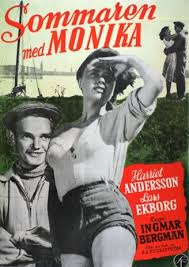
SUMMER WITH MONIKA
Sweden, 1953, 96 minutes, Black and white.
Harriet Andersson, Lars Ekborg.
Directed by Ingmar Bergman.
Summer with Monika is comparatively early Ingmar Bergman material. He was soon to move into heavier films with The Seventh Seal and Wild Strawberries which launched him into an international career which lasted almost fifty years. He made such classics as The Virgin Spring, Through a Glass Darkly (with Harriet Andersson), Winter Lights, The Silence, Cries and Whispers (again with Harriet Andersson), Best Intentions, Fanny and Alexander, Scenes of a Marriage and its thirty-years-after sequel, Saraband, his last film in 2003.
This film is straightforward: a young workman in a glass factory becomes besotted with a young seventeen-year-old girl, Monika. She is the lively character. They spend summer on an island, she becomes pregnant. He wants to settle down and marry. She is a rebel and wants the high life. The relationship cannot survive this.
The film is made in a straightforward style, naturalistic, emphasis on the locations and atmosphere. However, it is an anticipation of the career that Bergman was to have.
1. The work of Ingmar Bergman and this film in his career? Anticipating of later themes?
2. Scandinavian settings, black and white photography, musical score?
3. A smaller drama but indicating a growing scope in Bergman’s films? His cast?
4. How did the weather serve ad a symbol in the film? The eagerness of Spring, the Summer itself with Monica and its happiness. the Autumn and the Winter of discontent? The way that the seasons wore filmed?
5. The presentation of the two characters of the two characters and their typical meeting? How well did they get to know one another?
6. The quality of the relationship between Monica and Harry? With whom did the audience identify? Where were audience sympathies? Did the audience learn the characters of these two people?
7. The focus on Monica - the quality of Harriet Anderson’s performance, her youth, friendliness, her work, her pushiness towards Harry, her smoking, emotional response to the film, petting at Harry's home? The picture of Monica at her home, her self-centredness, her parents’ joy, the jubilee, the reasons for her leaving home? Her imposing herself on Harry and drawing on his love? On the boat, the sexual fulfilment? Her use of money, buying dresses? Her adolescent and her promise of fidelity forever? Why was the boat trip so happy, an escape from reality, a sunny holiday? The sequence of the dancing, by themselves? The influence of Leila and the fight, and his destruction of the boat and their things? This counterbalanced with the scene of their happiness and their learning to dance? Monica’s swim, her fresh nudity and the attraction for Harry? The happiness and the conception of the baby? The growing disillusionment after Lelle's intervention? The length of summer? Her petulance with Harry, the incident with the Mushrooms, the importance of her stealing the food and her disagreeable reaction to people's kindness? The return home and its solemnness? What had happened to Monica? The hastiness of the marriage? How happy was Monica in giving birth to the baby, the niceness of it all, the hospital? Life at home and her slovenliness? Her not waking, her complaints about the aunt and money? What was the reason for her infidelity? Her selfish response when caught? Her self pitying and going? Why did she go and what was her future? The importance of the sequence where she looks for so long at the audience? Audience response to this? How much insight into a girl and into a woman did this performance give?
8. How interesting a character was Harry? Audience sympathy for him? The quality of his work, being persecuted at work, his response to the workers? His shyness,, relationship with his father? Being pushed by Monica, petting her, falling in love with her? The quality of his help, his leaving his job, his happiness in opting out and holidaying with Monica? Why was he so happy? Relishing the trip?
9. The dance, the intervention with Leila and the fight preparation of this earlier? Feeling victimised – when Monica grew sullen? Not going to Rob with her? The importance of the marriage and the birth to her? The dawning of a new career in study? His care and concern for the baby? How important was the scene of his discovery of Monica’s infidelity? The impact on him? The sadness? The importance of the film ending with Harry and the baby looking into the mirror? What was being said in summary of Harry's life so far? The insight into a earnest young man and his relationship with a willful girl?
10. The film’s presentation of social pressures, the quality of work, money, parents, the quality of homes, the influence of the aunt, people in general, the contrast with the people who were stolen from?
11. What did the film have to say about the reality of love and marriage? What is love?
12. The film's comments on responsibility? Monica as irresponsible, Harry’s sense of responsibility?
13. What kind of picture of adolescence and growing up did this film give? How realistic, optimistic, pessimistic?
14. Was this obviously an Ingmar Bergman film? Why?
Published in Movie Reviews
Published in
Movie Reviews
Tagged under
Saturday, 18 September 2021 19:43
Sweet Ride, The
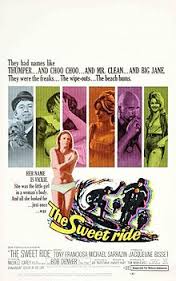
THE SWEET RIDE
1. The meaning of the title, application to themes, irony?
2. For what interests was this film made? For what age groups? Does it seem dated now or not?
3. How interesting was the film as a piece of Americana? The picturing of the drop-outs of the sixties, the hippie type atmosphere, California and Malibu? American heroes and non- heroes? American crime?
4. How important was the colour psychedelic atmosphere, modern music, wide screen?
5. The importance of the structure? Flashbacks? Did it involve the audience, or complicate the plot?
6. Where were audience sympathies directed? Which characters evoked most interest? What kind of people were presented?
7. Collie and Denny? What kind of characters? The reason for their existence, their life style? The atmosphere of surfing? Their self-centred behaviour, their standards, interest in others? Capacity for living, working? The violence inherent in their life style (the neighbour with the gun?) ambitions, painlessness? The question of age and achievement? The contrast between the two characters? Denny's changing and getting out while he could?
8. Was Vicky an attractive heroine? Our first knowledge through the accident, her parents, Denny? The presentation of her via Denny's memory? The truth about her? Her /involvement in Hollywood, with the producer? violence? The reconciliation with Denny? What future?
9. Comment on the film's presentation of Malabu. Collie's friends the characters,, their style of life, the worthwhileness of their life? The films comment on their escapism?
10. The contrast with Vicky's parents? The comparison with Malibu? The film's comment of this?
11. The picture of the bikies, their standards?
12. The ironic picture of Hollywood and the of producers,
contracts, violence?
13. Was there much insight in this picture of California? How entertaining? How valuable, a means of escapism?
Published in Movie Reviews
Published in
Movie Reviews
Tagged under
Saturday, 18 September 2021 19:43
Sweet Rosie O'Grady
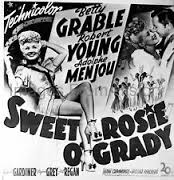
SWEET ROSIE O'GRADY
US, 1943, 74 minutes, Colour.
Betty Grable, Robert Young, Adolphe Menjou, Reginald Gardner, Virginia Grey.
Directed by Irving Cummings.
Sweet Rosie O’ Grady is a wartime Betty Grable musical. She was emerging as a very popular star at this time – especially with pinups and the armed forces.
This film is a remake of Love is News, a 1937 film with Loretta Young, Tyrone Power and Don Ameche. Betty Grable portrays a vaudeville star who has burlesque backgrounds and is keeping them secret, especially because she is engaged to an English duke (Reginald Gardner). A reporter from a muckraking paper is asked by the editor (Adolphe Menjou) to write an expose. He is played by Robert Young.
The film is brief, bright, colourful – wartime entertainment.
1. How entertaining a musical comedy? Quality?
2. A 20th Century Fox musical of the forties? A Betty Grable showcase? How conventional?
3, Colour photography, English and New York locations? Sets? The songs, dances? Special effects in the stage presentation of the songs?
4. The credibility of the plot? For musical comedy purposes? The success of a stage star? The newspaperman? Falling in leve?
5. Betty Grable as Rosie O'Grady, in England, success, marrying the Earl, the clash with Sam? Trying to put him down? The effect on herself? Her change to musical comedy and the parody of their relationship? The happy ending? Sam and his attack on her, wooing her, taking the parody? Marrying her?
6. The editor, the Count, Rosie's girlfriend?
7. The conflict, the crises, the tricks, the parody? Themes of human relationships? The film as a piece of Americana?
Published in Movie Reviews
Published in
Movie Reviews
Tagged under
Saturday, 18 September 2021 19:43
Sweet Smell of Success, The
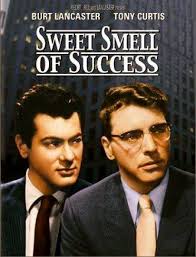
THE SWEET SMELL OF SUCCESS
US, 1957, 96 minutes, Black and white.
Burt Lancaster, Tony Curtis, Susan Harrison, Martin Milner, Sam Levine, Barbara Nichols, Jeff Donnell.
Directed by Alexander Mackendrick.
Sweet Smell of Success is a classic film noir drama from the mid-1950s. Burt Lancaster is at his best as a New York columnist with a wide readership, a talent for gossip, as well as a malevolent influence on people as well as malevolent reporting on them. He wants to break up a marriage (between Susan Harrison and Martin Milner) and employs a seedy press agent, played by Tony Curtis, to rake up scandals and break up the relationship.
Burt Lancaster was to go on to win an Oscar in 1960 as Elmer Gantry. Tony Curtis was at the beginning of his career in more serious films ranging from Trapeze (made with Lancaster the same year) and Spartacus.
The film was written by celebrated screenwriter Ernest Lehman and collaborated with playwright Clifford Odets (The Golden Boy, None But The Lonely Heart). Music is by Elmer Bernstein with the Chico Hamilton Quintet playing themselves.
The film uses its New York locations very strongly, giving an authentic atmosphere to this media world and its destructive element.
1. The irony and tone of the title? The values and criticism implied? Did this sum up the film?
2. How did the film draw audience fascination and disgust with the world it presented and its characters? How much insight into such a world and characters did the film offer? How much was shock value on the audience? Was this a good thing for this film? What was the audiences' basic response?
3. How effective were the black and white photography, the music and the musical background, the sharp words and literate dialogue, the ugly atmosphere of night and the gossip worlds the city of New York itself? Was the world too ugly, sinister, decadent? Was it just right for this film?
4. What were the implications in the film about human nature? Its good and bad, the jungle atmosphere of living, the need for survival and the ends justifying the means? What moral comment did the film make on this?
5. How was it easy to identify good and bad in this film? Was it too obvious? Too cut and dried? Did this indicate a type of morality play?
6. How central was Sydney Falco (falcon overtones of his name?) The effectiveness of Tony Curtis's portrayal, the ugliness of the character, his drives and ambitions, his con-man style of agency? the superficiality of his style of life, the evil, the lies, the ruining of people's lives? why did he change his mind about Susan? His hatred for JJ, a sneering man, finally outwitted? Where was his character most effectively presented? His future?
7. How effective was Burt Lancaster's portrayal of JJ? How could he belong to such a glossy gossip world, a world of power and corruption? How evil a man was he? Was his protection of his family motivated by any good? His sneering? attitude to people, the quality of his colouring truth and falsity, people fawning on him? His hold over Falco? His using of Falco? His cruelty in turning on him? The fact that he always won? What comment on human nature did this characterization make?
8. How were Susan and Steve obviously good characters? Were they portrayed strongly enough to get the good across? How were they portrayed as victims of evil? The nature of the sneers? The effectiveness of the musical background? The drug background and its turning against Falco?
9. How vividly drawn were the hangers-on in this world of gossip? The agents, the restaurant owners in need of publicity etc? The seekers of JJ's support?
10. Was this a film of character or harsh caricature presenting the world of ugliness in order to shock audiences and to give them a message?
11. How enjoyable a film? How valuable?
Published in Movie Reviews
Published in
Movie Reviews
Tagged under
Saturday, 18 September 2021 19:43
Swing Time
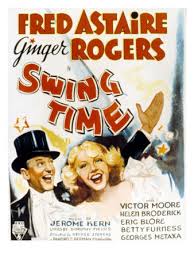
SWING TIME
US, 1936, 103 minutes, Black and white.
Fred Astaire, Ginger Rogers, Victor Moore, Helen Broderick.
Directed by George Stevens.
Swing Time is one of the best of the Astaire- Rogers musicals. The dancing pair had made an impact in Flying Down to Rio and then made a number of films including The Gay Divorcee, Follow the Fleet. This film was directed by George Stevens, a director of more serious films including Penny Serenade, A Place in the Sun, Giant and The Greatest Story Ever Told.
The plotline is very slight, Fred Astaire playing Lucky, who was to marry Margaret (Betty Furness) but goes to New York to raise money and falls in love with a dance instructress played by Ginger Rogers.
There are touches of comedy, but the main emphasis on the dancing and the songs by Jerome Kern and Dorothy Fields which include the Oscar-winning ‘The Way You Look Tonight’ as well as ‘Pick Yourself Up’ and ‘A Fine Romance’.
1. An enjoyable popular musical? Considered one of the best Astaire/Rogers musicals? Impact in its time, now?
2. The appeal of Fred Astaire and Ginger Rogers? in the thirties? Their individual talents, combination? Part of a series of films to entertain people in the thirties, in the atmosphere of the Depression? The comedy style, musical styles? Black and white photography, special effects (the Bojangles sequence)?
3. How credible was the plot? The conventional material, characters, situations and coincidences from traditional musical comedy? Audience expectations from these conventions, their fulfilment? The sub-plot and the comedy routines? A fairy-tale story of wealth and luck in the atmosphere of the Depression? Luck, wealth, love and romance? The title?
4. The film as reflecting America in the thirties? America as the land of opportunity, the land of Depression? America and its luck? Easy fortunes, gambling, quick loss of fortune? Enterprise and success in this atmosphere? The film's comment, critique?
5. The personality and style of Fred Astaire as John Garnet? His opening dance routines and the introduction of him in his work, reputation? The comedy of the preparations for the wedding and his friends trying to impede his progress to the wedding, the various tricks they used, for example, the trousers, the phone calls? The conflict with his potential in-law family? His decision to go to New York? The humour of his fashionable appearance in New York and these appearances impressing people? Penny and the situation with the policeman, learning to dance, her losing her job, the manager of the dance instruction house? Penny regaining her job? John Garnet and his character, gambling? His ability to dance and the way this was worked into the plot? The relationship between Penny and Lucky? Pop and Mabel and their support? The comedy and farcical situations? the style of the thirties' screwball comedy? The necessary deceptions and the courting? The arrival of the fiancee and the ironic revelation of the truth? The appropriate happy ending? A successful man in the Depression?
6. Ginger Rogers and her style as Penny, her comic flair, dancing, her job, losing her job, the dancing lesson, her love for Lucky, the sequences of humour in rejecting him? Their songs together? Taking Rick on the rebound? The happy ending?
7. The characters of Pop and Mabel as echoing the principal characters? The humorous parodying of the dancers, the romance? Gambling?
8. Rick as the conventional conductor of a band in the thirties? The fact that his band could be gambled away? Rick as a rival for Penny? His almost marrying Penny and his gallant behaviour at the end?
9. The theme of gambling, picquet, the casino, the cards, the band? The jokes about money and trying to find enough to avoid going back to be married?
10. The farcical situations, the contrived, crises, emotional response from the audience and longing for the happy ending and reconciliation?
11. The famous songs: The Jerome Kern score, the dancing, special effects for the dancing? The quality of the film as a musical?
12. Light entertainment, presuppositions about happiness?
Published in Movie Reviews
Published in
Movie Reviews
Tagged under
Saturday, 18 September 2021 19:43
Swiss Family Robinson, The
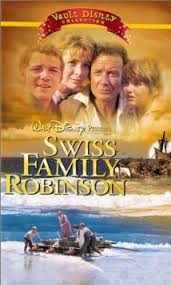
THE SWISS FAMILY ROBINSON
US, 1960, 126 minutes, Colour.
John Mills, Dorothy Mc Guire, James Mac Arthur, Janet Munro, Sessue Hayakawa, Tommy Kirk, Kevin Corcoran, Cecil Parker.
Directed by Ken Annakin.
The Swiss Family Robinson is one of the most popular of the Disney live action features. It was directed by Ken Annakin who had made The Sword and the Rose in England for Disney in the early 1950s. Annakin had made a number of small British comedies and thrillers but was to make Those Magnificent Men in Their Flying Machines and its companion Monte Carlo or Bust during the 1960s.
The film is based on the classic novel by Johann David Wyss. Filmed a number of times, it seemed the ideal subject for a Disney live action feature which had developed since the mid-1950s. The cast is very strong with John Mills and Dorothy Mc Guire as the parents and James Mac Arthur who had appeared in a number of Disney films including Kidnapped as the older son. The film has all the elements of stories of people shipwrecked on desert islands and having to survive. The Robinson in the title alludes to Robinson Crusoe, the classic story of this kind of shipwreck. However, it has been the subject of so many films including Nim’s Island as well as The Blue Lagoon.
1. A Disney film. Was it good entertainment? Quality entertainment? The production values and the way that it was filmed?
2 Was it a good adventure? The period setting, the ship adventure, the isolated island, adventures from foreign island, pirates and battles? Were these good ingredients for an entertaining film? Why?
3. The film was about a family. Was it good family entertainment? Why? How exciting was the sequence of the wreck? How dramatically was it filmed? Was the escape plausible? The atmosphere of the wreck, the danger, the hope for survival? How desperately did they want to survive?
4. How plausible was it that they should have rescued so much material from the ship? (Did plausibility matter in this film?)
5. How authentic did the film seem? The voyage and the wreck, the family migrating, the nature of the island, their resourcefulness on the island?
6. Were they an attractive family? Could the audience identify with them easily? How attractive and kindly was mother? How strong and resourceful and decisive was father? Did you like the three sons? How serious was Ernst? How heroic was Brits? How mischievous was Francis? What were your impressions of the island? Could you have survived there as they did?
7. The importance of the sequence with the lion? The elephant? Were the dangers and challenges realistically portrayed? Or were they too contrived for this film?
8. How happy were the sequences of them settling onto the island and of their building the house? How well did the family settle? What about Francis's mischief? The house in the trees? Could they have settled there permanently? The happiness of the family together?
9. How strong was the atmosphere of nostalgia? The sequences where they thought about their old way of life? And yet they had embarked on a new way of life?
10. Were the pirates convincing? Were they frightening? The dangers for the family? The need then for the boys to find out what was happening? The need for pirates to be in the film to give some conflict and adventure for it? Wore they effective in this way?
11. How did the English captain and his granddaughter change the atmosphere of the film? Did they seem to intrude? How real was the danger? of the escape? The danger of the boys with Roberta?
12 How important for the film were the adventures on the way back to the home? The discovery that Roberta was a girl, the rivalry among the boys, falling in love with Roberta? The actual dangers of the island and being lost? Were these sequences exciting? How well were they counterpointed by the sequences of mother and father and Francis at home? The Christmas nostalgia? The longing for the boys and the joy when they arrived?
13. How well did the film show a girl changing the lives of boys? Who really loved her? Was the rivalry plausible, their fights?
14. Would life still have been possible in happiness after the arrival of Roberta? Or did something have to happen and their lives change? For the future of the boys?
15. How interesting was the climax with the arrival of the pirates again? Were the pirates merely villains? Were they characters at all? Was the need for self defence clearly put in the film? What else could the family have done?
16. How exciting was the battle? Was it realistic? Far fetched? The ingenuity of the defence and the carrying out of the defence Could they have saved themselves at all?
17. Did you mind the coincidence of the arrival of the English? Was this appropriate for this kind of film? Were you glad that there was a happy ending?
18. What future did they all have? Were they wise to stay on the island? Was Ernst right in going back to England? Would they have a happy future?
19 How happy a film was this? How optimistic about human nature and resourcefulness? Do people need films like this for entertainment? For encouragement?
Published in Movie Reviews
Published in
Movie Reviews
Tagged under
Saturday, 18 September 2021 19:43
Swiss Makers, The
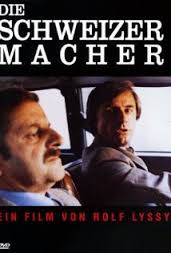
THE SWISS MAKERS
Switzerland, 1978, 103 minutes, Colour.
Emile Steinberger, Walo Luond.
Directed by Rolf Lyssy.
The Swiss Makers was a very popular film in its time. It focuses on Swiss authorities and their investigations of foreigners applying for Swiss citizenship. This gives the opportunity to roll out all the caricatures and clichés and stereotypes about the Swiss – as well as some of those of the nationalities of people applying for citizenship, including Germans and Italians.
The film focuses on the police and their investigations as well as the attempts by the various people to get their citizenship – and the humorous mistakes they make.
While the film was released in the late 1970s, it obviously has some relevance to experiences in Europe in later decades especially with the variety of migrations in the European Union.
1. An entertaining and funny film? Its universal appeal? The work of the Swiss film industry? Influence of television production?
2. The basic appeal of comedy, satire? The significance of the title? The credits sequence? The indication of satire about the Swiss, their pretensions, demands, attitudes towards their neighbours? The essence of being Swiss?
3. The humour of the plot? its serious framework, the facts of people becoming Swiss citizens? The interrogations? Bureaucracy? Audience reaction to the satiric presentation of bureaucracy? The ability of the Swiss to criticise themselves?
4. The initial focus on the training of the inspectors? The initial talk and the mockery of the characteristics of the Swiss? The further mocking during the interrogations, the spying on the would be citizens? The ambiguous and humorous satiric dialogue?
5. Bodmer as a comic character? As embodying the pretensions of the bureaucratic Swiss? his self-importance and pomposity? his serious approach to things? Seeing him at work, with his assistant? his beliefs, his not questioning his beliefs? The eccentric manifestations? his loyalty to the State? The domestic sequences, personal mannerisms, relationship with his wife? his training of Fischer? his reaction to each of the candidates, interfering in their lives, watching, on the lookout to trap them? The jokes at his expense?
6. The contrast with Fischer - the naive young man following Bodmer, helping him? Audience comparisons between the two? Fischer and the audience seeing through Bodmer? Fischer's change?
7. The portrait of the girl, her hopes for her Swiss citizenship, her theatrical career, dancing, her friends? The outings? Bodmer's thinking about drugs and trying to trap her? The trick played on him by Fischer and the girl? Fischer and his falling in love with her, the outings together, her suspicions? Bodmer's visit in the early morning? The decision not to take out Swiss citizenship and to leave Switzerland?
8. The introduction to the doctor? Bodmer and. the mistakes at the asylum? The wife and her seeming to go to the sex shop? The failure of the dinner? The interrogations, the presents? the money in his pocket? The hastening to the interrogation by the committee?
9. The Italian and his politics, the restaurant, the demonstrations?
10. The committee interrogation sequences - a more balanced approach to Swiss citizenship?
11. The scenes of happiness with the doctor and his wife celebrating at the hospital? The Italian family and the humour about William Tell?
12. The contrast with Fischer and his resignation, the girl and her going to Holland? The airport sequence and their leaving Switzerland?
13. The serious undertones behind the self-mockery by the Swiss? The critique of pomposity? The highlighting of Swiss citizenship? The value of being able to laugh at oneself? The insight from laughter?
Published in Movie Reviews
Published in
Movie Reviews
Tagged under
Saturday, 18 September 2021 19:43
Sword of Lancelot
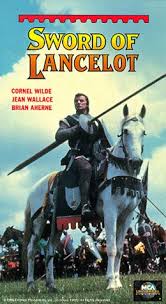
SWORD OF LANCELOT
US, 1963, 116 minutes, Colour.
Cornel Wilde, Jean Wallace, Brian Aherne, George Baker, Adrienne Corri, Mark Dignam, Reginald Beckwith, Joseph Tomolti, Graeme Stark.
Directed by Cornel Wilde.
Sword of Lancelot came at the end of a number of popular films on King Arthur in the 1950s including Prince Valiant, The Knights of the Round Table. This was the period of Camelot which was filmed four years later. The film was directed by Cornel Wilde who had been a popular Hollywood star in Forever Amber, The Greatest Show on Earth in the 1940s and 50s. However, in the 1950s, he turned to directing and made a number of strong dramas and action films for the next twenty years, Maracaibo, The Naked Prey, Beach Red and No Blade of Grass amongst others.
Wilde is Sir Lancelot while his then-wife, Jean Wallace, who appeared in most of his films is Guinevere. Brian Aherne is King Arthur.
The film is a mixture of the British and American styles with so many of the supporting cast being British. However, it is an enjoyable variation on the legends.
1. An enjoyable spectacle? What qualities were to the fore in this production? poorer aspects?
2. How interesting is such a spectacle in its comparisons with modern attitudes towards chivalry, barbarity, heroism, love, morality? Did the film explore these themes well?
3. Why do audiences respond to the Legend of King Arthur? The heroism and idealism of Camelot? How much of a reality was this? How much of the legend appeared here? Nobility of Arthur and his knights, the days of chivalry and heroism? How obvious was it that the legend went sour? Guinevere and her love, Lancelot’s betrayal, wars and death?
4. How attractive a hero in this film was Lancelot? Where was his heroism best manifest? His French background, his skill at the tournament, his response to Guinevere, his chivalry, his loyalty to Arthur, his role in the court as cheerful and supportive, his gradual growing in love with Guinevere? temptation to betray Arthur? change in his life with deaths and destruction, the change in his character,his surrender to Guinevere, his final surrender to Arthur? Hie capacity to wait for Guinevere, and Arthur's death? His response to the end of Camelot and his attack on Mordred? His reaction to Guinevere being a nun?
5. Guinevere, attractive heroine, how strong willed, her backggound and the tournament for her hand? Her political role in a united England? Her dependence on Lancelot? Her love for him and her love for Arthur? Her playing with Lancelot and leading him on? Her seduction of him? The reality of her being burnt and rescued? Audience response to this barbarity? the change and the possibility for loving Lancelot and yet his surrender of her to the convent? Was her final change in the convent credible?
6. How was King Arthur portrayed in this film? As popular belief has it? How real as a king of united Britain did he seem? How unreal in his idealism? His relationship to Lancelot and his knights? Mordred and the kingdom? The feeling in his being betrayed by Guinevere? His attitude towards her burning? The irony of his death by Mordred and the destruction of his dream?
7. Was Mordred a convincing villain? Why?
8. How interesting were the subplots eg Sir Gawain and his vengeance for his brother's death? (And the quality of George Baker's performance?)
9. How interesting were the minor characters in their illumination of Lancelot and Guinevere? Sir Tors?
10. How well filmed were the fights, the initial tournament and the way it was seen through the combatants’ eyes? Battle with the Vikings and the elaborate strategy and its execution? the confrontation with Gawain and Arthur? The final battte? Realistic and violent? Suitable for this film?
11. How wel1 did the film portray details: the love between Guinevere and Lancelot? Mordred’s plots, the Vikings and their brutality, the gossip in the court to Arthur’s ear?
12. How much of a matinee film was this? How much of an adult spectacle?
Published in Movie Reviews
Published in
Movie Reviews
Tagged under